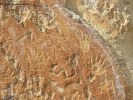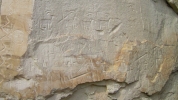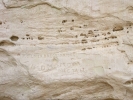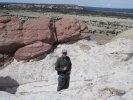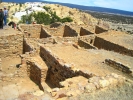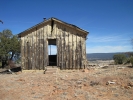03/17/2011 to 03/18/2011
Time to get away for a few days, and one of our favorite places to go is New Mexico. Yes, AGAIN. Well, it is close and full of great things to see and do.
This trip we headed toward Grants. We booked a cabin at El Morro RV Park and Cabin Rental. Very interesting group. However, the coffee at the restaurant and at the Inscription Rock Trading Post next door, is very good. The folks who run both are very nice and helpful and we highly recommend you stop in to either if you are passing on Highway 53.
Driving around New Mexico we have often seen signs for Sky City, the Acoma Pueblo, and we decided it was time for a quick trip. The Pueblo was built around 1100 and claims to be the oldest continuously inhabited community and they vehemently dismiss the Taos Pueblo peoples claims. The full time citizens live as their ancestors did with no electricity, plumbing or modern conveniences. However we did see numerous propane heating tanks and several large gas generators. The residents are also allowed to drive their vehicles into the pueblo, unlike Taos.
Our guide was very friendly with a good sense of humor so we thoroughly enjoyed our tour. At the end we were given a choice of riding the bus back down or taking the ancient stairway. We opted for the stairs. Now, these have been improved over the centuries, but you can see the original hand and foot holds that people used to ascend and descend. And the women did it carrying ollos of water on their heads. Geesh
This is the oldest building in the pueblo. The people are trying various ways to preserve it, but it is not easy
The San Esteban Del Rey Mission. Building started in 1630 and built with slave labor. The pueblo residents hauled over 20,000 tons of earth and stone from the valley floor
On the valley floor there are Acoma homes both occupied and abandoned. The rock formations are impressive
El Morro National Monument was established in 1906 and was one of the first to be so designated. It has two trails, this one is Inscription Trail. Over the centuries native Americans, Spanish and later settlers all left their marks on this sandstone cliff. From petroglyphs to inscribed names of Spanish conquistadors, US Army members and those going west it is all there to enjoy.
Another Spanish visitor. The Park Service used to highlight these with graphite to help views see them better, but that practice was stopped
The Headland Trail meanders up the mesa and eventually ties into Inscription Trail - unless that section is closed due to ice and snow as it was today. The trail itself covers many variations in geology and there is not a bad view anywhere.
It will also take you to The Astinna ruins. At one time over 1500 people lived here. A small portion of the settlement was excavated in 1950 but it is possible it was larger than Chaco Canyon.
Our schedule today included hiking up Bond Mesa, which sits just in back of our cabin, doing the Headland Trail in El Morro National Monument, and then going home.
Bond Mesa was once settled by a local family, then it was home to a Ranger Station complete with look-out tower. Now it is abandoned except for lots of critters who leave their footprints but know how important it is to hide.
